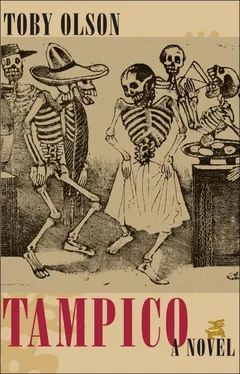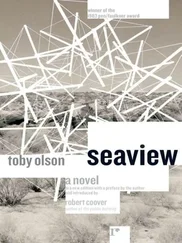The house was at the end of a long dirt road, bayberry and beach plum bushes dipping in at the shoulders, and before I came in sight of it, up on a slight promontory at the bay’s edge, I’d had to turn my lights on to see the ruts and turnings. The sun had gone down into a cloud bank at the horizon, and though it was just after four, it was dark as the end of evening. My headlights swept the windblown scrub guarding the house from clear view as I turned in at the drive, and they met another light, something dim on the far side, and I turned them off as I rolled to a stop, my tires crunching in shells where the drive ended in a parking area. There was no car there, and I realized I’d not asked Warren about one. Had Strickland driven himself to the airport?
I climbed out, pushing the door closed carefully until the lock clicked, then stepped along the stone pathway that led to the small front porch. There was no light in the fixture above the door, and the windows beside it were closed and locked. The pathway led to both sides of the house, and I took the right branch, touching the wooden shingles and ducking below the window frames as I headed toward the side, and when I got there and turned, a stiff wind hit against my chest as it rushed in off the bay. I could see the light ahead, a glow in a window where the house ended, a cement column supporting a broad, open deck, its edge visible, and I could hear something, music I thought, dissonant and carried on the wind. The pathway descended, cut down into the earth, and soon I was below the shingles and touching the house foundation, and when I reached the window and was under it, the sill was high up and beyond my fingertips and the music was louder and I thought I could feel it through my hands. I looked to the right and saw the oak tree, above the steep embankment, and turned and went back up the path, then stepped beyond it and worked my way through scrub pine and honeysuckle until I reached the tree. It was an easy climb and I needed no more than a few feet, and soon I was settled into a crotch in the branches and was looking in at the window.
The room beyond was a small library, bookcases and the books in them lined up in careful rows against the back and side walls. I could see a dark oriental on the floor, glowing in the illumination cast down upon it from track lighting suspended from the ceiling. There was an easy chair to either side, the one on the left bathed in the light of a floor lamp close behind it, and in that one a man was sitting, eyes closed, his head back on the cushion, and I could hear the music rising. He was a small man, in a grey jumpsuit, and the chair was large, and it and the music, deep and percussive, seemed to be swallowing him. The window seemed to be vibrating, and the figure of the man beyond it slipped in and out of focus. I could see his dark hair, bunched at his neck, thick fingers spread apart on the chair arms. He wasn’t sleeping. The music was too loud for that. He was listening, and I saw his face move to the side from time to time and thought he must be feeling rhythm or the intent in some complexity of a rhythmic figure.
I climbed down out of the tree and went to the door again, then opened the screen and knocked loudly. I could hear the music in the distance. Then I knocked again and waited, but he didn’t come. I tried it a few more times, but there was no response, so I headed back to the tree, scooping up a handful of shell fragments as I went.
He was still sitting in the chair. The hair at his neck had fallen down a little at his cheek, and I could see it was braided, a short braid, but as thick as a small log. Then the music stopped, end of a movement or the piece itself, and before it could begin again I cast some shells at the window, hearing them click against the glass.
He heard them too. His head lifted from the cushion, eyes open now, black pools. Then he pushed up out of the chair and crossed to the window and cupped his hands around his face and stared out. Then he dropped his hands and turned and went out of sight. The overhead lights went out, and I saw his shadow figure as he moved to the floor lamp. Then the room was completely dark and I heard the window riding up in the frame, and in a moment he was leaning out and looking across at me, smiling.
“What in the world are you doing in that tree?” he said. “Is that a place for you?”
The kitchen looked out on the deck and the bay beyond, and the large windows were coated with a light dusting of windblown sand. “I ought to have cleaned those,” he said.
I’d asked him about Strickland’s cough, and he said he was no smoker.
“Something chronic. In the last few months I’d say.”
Then I’d asked him about the music.
“Ives,” he said. “I figured to spend some time trying to hear it, playing it loud enough.”
The death came back to him then, though briefly. He looked to the side, at the sandy windows, then reached up behind his head and pulled at the gathering of hair. I could see the result at his temples, his broad and unwrinkled forehead and his momentarily lifted brows. Then his hand was back at the table, his finger circling the cup’s rim.
He’d been working for Strickland for close to a year, taking care of the house when he was away, living in a basement room there. Strickland had left for the airport early, and he’d set to work, cleaning the place up and repairing a couple of broken shutters. There was other work to be done, and he’d taken it up in the next few days, reading and listening to music in the evenings, getting to bed early. The phone machine was on. That was their arrangement, and he’d had no reason to check it. Strickland was a doctor, but out here in Orleans he was a recluse. He read books and studied his documents and remained unavailable to the city throughout the day. He’d check the phone calls in the evening, then answer the ones that were necessary. He never called the house when he was away in Philadelphia.
“I wonder what I’ll be doing now,” Carlos said.
He put it strangely, both real question and acknowledgment of choices. There was no anticipation in his voice, nor was he looking for the answer yet, not from himself and certainly not from me. I gave it without thinking, as if it were the most natural thing in the world, and I don’t know why I did, though I’ve not troubled this decision because it was the right one.
“Well,” I said. “I’ve got a whole empty house and there’s some work to do. I can’t pay you anything yet, but maybe later that would be possible. You’ll have your privacy.”
He looked up at me and held my eyes for a good long while, and I think I blushed and I think he was waiting for that, and only then did he speak.
“That’s very good,” he said. “Let’s call it a deal.”
Driving back in the darkness to Provincetown I told him about myself, about Sara and our divorce, my years on the force and my new position as a private investigator. I even told him about my mother’s death and the little money she’d left me. I couldn’t seem to stop talking. Then I invited him to Thanksgiving dinner, and he accepted, and when we got back to the house we stayed up into the night and I told him about the HIV and he told me a few things about himself.
We spent a good part of the next day getting Carlos settled in. The guest bedroom was full of boxes and old clothing, and I even had the rubber raft in there. We lugged things down the basement stairs and Carlos knocked together some wooden skids to put them on.
The guest bedroom had its own private bath, and once we’d scrubbed and vacuumed, the place looked bright and cheery, and Carlos whistled softly as he opened the closet door and hung his clothes. I left him to it and went to the kitchen to take stock of things for Thanksgiving dinner, and in a while he was beside me at the sink, holding the turkey’s breast as I stripped away the plastic covering, then fished in the cavity for the sack of giblets. We had things ready by six, and I called out for Chinese food. “Sesame noodles,” Carlos said when I asked him, and we spent the rest of the evening in front of the television, watching an old movie about cowboys and Indians.
Читать дальше












